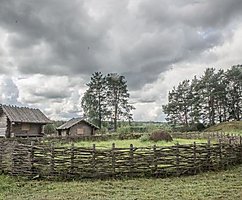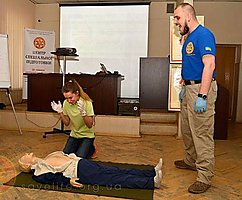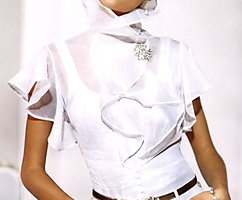Worked as Institute for noble maidens
 Bashny.Net
Bashny.Net
In the eighteenth century the education system in the Russian Empire was literally shaking with innovations and reforms. About them you probably don't remember, so we have to tell.
Today access to education is one of the main indicators of democratization. The idea of universal education irrespective of caste, class and other prejudices came to the philosophers of the Enlightenment, which linked knowledge with power.
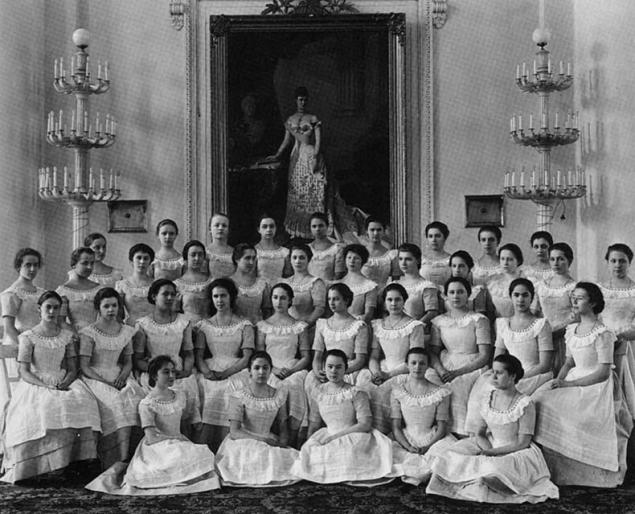
John Locke argued that man is a "tabula rasa", a clean, blank slate. This void content fills the culture. So education is not only learning, but the formation of man, his guidance, values, morals.
The Enlightenment philosophers interested in not only how to change the nature, but also how to cultivate a new generation of enlightened people.
A curious fact: many of the ideas of these thinkers did not yet found use in Europe, but they took in the surroundings of Catherine II and tried to implement in Russia. The best examples of such implementation, which greatly influenced the Russian culture and history, and we'll talk.
How it all began
Ivan Ivanovich Betskoy went down in history as close to Catherine II, statesman and public figure, a man of the Enlightenment, the founding of educational institutions in St. Petersburg and Moscow.
The decree "on freedom of the nobility" in 1762 released the nobles from compulsory military service, and the state received a new duty to motivate nobleman on the execution of his duty. After order has been impossible.
If in Europe under the influence of technical progress and early capitalism arose a new class of the bourgeoisie, before Russia was a different problem – to educate the devotees to the state of educated nobles.
Produce the first by way of Education, so to speak, a new breed, or new fathers and mothers that could have their children the same direct and thorough rules education of the heart is to give what they got themselves, and their children would betray packs for their children, and so following childbirth in childbirth in the future ages.
Ivan Betskoy, the founder of the Institute for Noble maidens
Since many of the attitudes and values of a person are laid in early age, it was obvious that education should apply to women. They becoming mothers who will instill their values on children.
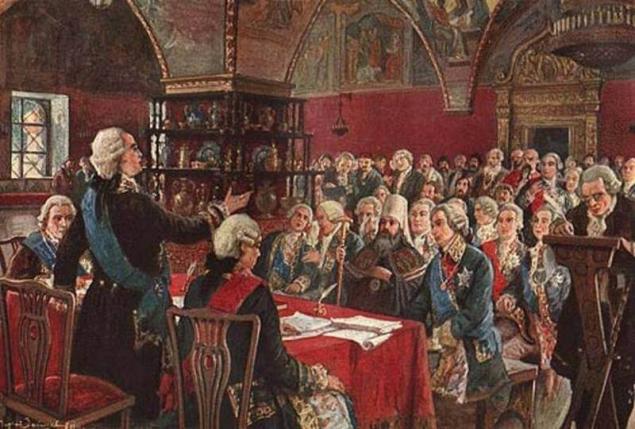
Catherine II, source: Wikipedia
The issue of women's education
Yuri Lotman provides some evidence of women's education in Russia of the XVIII century. So, A. Bolotov refused one bride due to the fact that he wrote many books, but then he found a wife who knew how to write and read.
He also cites a passage from Fonvizin: the Question of women's education emerged in the early XVIII century, when Peter I issued a special decree forbidding to marry girls unable to sign.
Of course, it is not necessary to think that in pre-Petrine times the girls in Russia were extremely illiterate. Just remember that birch bark scrolls, which were written for reading in a normal family, testify to the literacy of women to the XV century. However, in modern times the question of the necessity of female education from the subject of disputes has become a problem of national importance.
Fenelon, the one which reads Sophia in "Minor" Fonvizin, as we remember, do not teach bad. In the same Comedy Prost furious that Sophia receives a letter and she can read it.
Yuri Lotman, literary critic, art historian, semiotician,
In the second half of the XVIII century. girls were educated in private boarding schools, at home and in public institutions, the creation of which was attended by I. I. Betsky.
Catherine II easily took an educational project Betskoy, as she was influenced by the French enlightenment. One such project was the Smolny Institute where the girls studied French and German language, as well as architecture, physics and mathematics. However, Lotman considers that training at the Institute was very superficial, all the subjects other than languages and dancing, were taught very poorly.
The Institute was divided into two parts: the bourgeois and the nobility, who were at enmity between themselves. Often the schoolgirl became an orphan girl of noble birth. They had to study for 9 years. Their ultimate goal was to be a maid of honor, when great learning was possible.
Education for social events
Smolyanka were divided into three groups by age. The first three years girls were called "coffee" and lived for nine people. The average group – girls puberty – called "blue", they wore blue dresses. Senior group – "white", because they were allowed to attend the balls. Each girl had to choose a role model – girls from the senior group or the Imperial family.
Etiquette and good manners have paid a lot more attention than education. Girls had forever to learn how to behave in society.
Allotted gaming time is strictly limited. Educator, which depended on real mode of life at the Institute, usually had no pedagogical education and the sample was chosen the monastic way of shelter or barrack mode
Andrei Zorin, doctor of philological Sciences
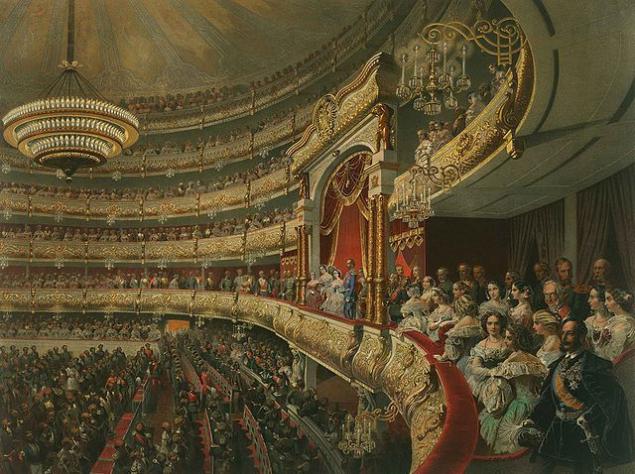
Theatre, source: Wikipedia
The role of theatre
Life in the Smolny was far from ideal: the constant quarrels and clashes between students, strict discipline and poor nutrition. Here's how to write about this Lotman: "Reserved for gaming time is strictly limited. Educator, which depended on real mode of life at the Institute, usually had no pedagogical education and the sample was chosen the monastic way of shelter or barrack mode".
In 1770, at the Smolny theatre was opened with the aim of the project is an ideal education. To put on plays in the Smolny began a year later. The performances were about to go out, so they paid a lot of attention. The theater remained a place where the pupil could open up new feelings and emotions.
What is love? How to play the game and whether or not to reciprocate? The answers to these questions were revealed before the smolyanka during the game. For the implementation of the educational project was influenced by the theater.
Pupils not only enjoyed reincarnated on stage, but watching how others play. The girls in the theater loved it, it was very different from everything else at the Institute.
In the same way as in ancient Greek theatre, should be not only exemplary and the right actress, but also an exemplary spectator. The girls went right to respond to actions happening on the stage, therefore, Catherine II showed a personal example of the manifestation of emotions during the performance. To do this, her seat was right in front of the stage that her behaviour could follow (and imitate him) the whole room.
"Learn by playing" in the counsel of the philosopher Rousseau is a new approach to learning that is easily mastered girls in the Smolny.
"To korenici heart" girls moral principle, it was necessary to strictly regulate access to the "symbolic models of emotions", set the "emotional standards", which they had to follow, and set the "emotional matrix", which they had to navigate
Andrei Zorin, doctor of philological Sciences
Adam and eve. Lucas Cranach, source: Wikipedia
The fruits of the project
The first graduates of the Smolny, growing up in a closed environment, were not fully adapted to life in the light. Their manners, way of thinking and feeling certainly inspired on the exploits of the Russian nobility of the beginning of the XIX century Some of them became maids of honour, someone successfully married, and others have become teachers at other institutions and at home.
Of course, noble morals and a love of reading literature in different languages, lofty ideals of love could not fail to affect other generations.
Many of the Decembrists were members of the smolyanka, which in family life had to prove to others their right to proudly wear the title of graduates. In school, I worked as a inspector class itself named after K. D. Ushinsky. Despite the fact that the institution lasted until 1917, we can say that he had a great influence on the Golden Age of Russian culture.
10 ways to look at LIFE from the OTHER side
Tony Robbins: Words can change the brain
However, the great plan of transformation of human nature, getting rid of blind obedience to customs and cultivation of high moral ideals in 1917, was not over. The project of Education is so ingrained in the public consciousness that the idea of format of a person under the state's needs continued to be of great importance in the domestic politics of many Nations.published
Author: Kirill Dobronravov
Source: newtonew.com/discussions/institut_blagorodnih_devic
Today access to education is one of the main indicators of democratization. The idea of universal education irrespective of caste, class and other prejudices came to the philosophers of the Enlightenment, which linked knowledge with power.

John Locke argued that man is a "tabula rasa", a clean, blank slate. This void content fills the culture. So education is not only learning, but the formation of man, his guidance, values, morals.
The Enlightenment philosophers interested in not only how to change the nature, but also how to cultivate a new generation of enlightened people.
A curious fact: many of the ideas of these thinkers did not yet found use in Europe, but they took in the surroundings of Catherine II and tried to implement in Russia. The best examples of such implementation, which greatly influenced the Russian culture and history, and we'll talk.
How it all began
Ivan Ivanovich Betskoy went down in history as close to Catherine II, statesman and public figure, a man of the Enlightenment, the founding of educational institutions in St. Petersburg and Moscow.
The decree "on freedom of the nobility" in 1762 released the nobles from compulsory military service, and the state received a new duty to motivate nobleman on the execution of his duty. After order has been impossible.
If in Europe under the influence of technical progress and early capitalism arose a new class of the bourgeoisie, before Russia was a different problem – to educate the devotees to the state of educated nobles.
Produce the first by way of Education, so to speak, a new breed, or new fathers and mothers that could have their children the same direct and thorough rules education of the heart is to give what they got themselves, and their children would betray packs for their children, and so following childbirth in childbirth in the future ages.
Ivan Betskoy, the founder of the Institute for Noble maidens
Since many of the attitudes and values of a person are laid in early age, it was obvious that education should apply to women. They becoming mothers who will instill their values on children.

Catherine II, source: Wikipedia
The issue of women's education
Yuri Lotman provides some evidence of women's education in Russia of the XVIII century. So, A. Bolotov refused one bride due to the fact that he wrote many books, but then he found a wife who knew how to write and read.
He also cites a passage from Fonvizin: the Question of women's education emerged in the early XVIII century, when Peter I issued a special decree forbidding to marry girls unable to sign.
Of course, it is not necessary to think that in pre-Petrine times the girls in Russia were extremely illiterate. Just remember that birch bark scrolls, which were written for reading in a normal family, testify to the literacy of women to the XV century. However, in modern times the question of the necessity of female education from the subject of disputes has become a problem of national importance.
Fenelon, the one which reads Sophia in "Minor" Fonvizin, as we remember, do not teach bad. In the same Comedy Prost furious that Sophia receives a letter and she can read it.
Yuri Lotman, literary critic, art historian, semiotician,
In the second half of the XVIII century. girls were educated in private boarding schools, at home and in public institutions, the creation of which was attended by I. I. Betsky.
Catherine II easily took an educational project Betskoy, as she was influenced by the French enlightenment. One such project was the Smolny Institute where the girls studied French and German language, as well as architecture, physics and mathematics. However, Lotman considers that training at the Institute was very superficial, all the subjects other than languages and dancing, were taught very poorly.
The Institute was divided into two parts: the bourgeois and the nobility, who were at enmity between themselves. Often the schoolgirl became an orphan girl of noble birth. They had to study for 9 years. Their ultimate goal was to be a maid of honor, when great learning was possible.
Education for social events
Smolyanka were divided into three groups by age. The first three years girls were called "coffee" and lived for nine people. The average group – girls puberty – called "blue", they wore blue dresses. Senior group – "white", because they were allowed to attend the balls. Each girl had to choose a role model – girls from the senior group or the Imperial family.
Etiquette and good manners have paid a lot more attention than education. Girls had forever to learn how to behave in society.
Allotted gaming time is strictly limited. Educator, which depended on real mode of life at the Institute, usually had no pedagogical education and the sample was chosen the monastic way of shelter or barrack mode
Andrei Zorin, doctor of philological Sciences

Theatre, source: Wikipedia
The role of theatre
Life in the Smolny was far from ideal: the constant quarrels and clashes between students, strict discipline and poor nutrition. Here's how to write about this Lotman: "Reserved for gaming time is strictly limited. Educator, which depended on real mode of life at the Institute, usually had no pedagogical education and the sample was chosen the monastic way of shelter or barrack mode".
In 1770, at the Smolny theatre was opened with the aim of the project is an ideal education. To put on plays in the Smolny began a year later. The performances were about to go out, so they paid a lot of attention. The theater remained a place where the pupil could open up new feelings and emotions.
What is love? How to play the game and whether or not to reciprocate? The answers to these questions were revealed before the smolyanka during the game. For the implementation of the educational project was influenced by the theater.
Pupils not only enjoyed reincarnated on stage, but watching how others play. The girls in the theater loved it, it was very different from everything else at the Institute.
In the same way as in ancient Greek theatre, should be not only exemplary and the right actress, but also an exemplary spectator. The girls went right to respond to actions happening on the stage, therefore, Catherine II showed a personal example of the manifestation of emotions during the performance. To do this, her seat was right in front of the stage that her behaviour could follow (and imitate him) the whole room.
"Learn by playing" in the counsel of the philosopher Rousseau is a new approach to learning that is easily mastered girls in the Smolny.
"To korenici heart" girls moral principle, it was necessary to strictly regulate access to the "symbolic models of emotions", set the "emotional standards", which they had to follow, and set the "emotional matrix", which they had to navigate
Andrei Zorin, doctor of philological Sciences
Adam and eve. Lucas Cranach, source: Wikipedia
The fruits of the project
The first graduates of the Smolny, growing up in a closed environment, were not fully adapted to life in the light. Their manners, way of thinking and feeling certainly inspired on the exploits of the Russian nobility of the beginning of the XIX century Some of them became maids of honour, someone successfully married, and others have become teachers at other institutions and at home.
Of course, noble morals and a love of reading literature in different languages, lofty ideals of love could not fail to affect other generations.
Many of the Decembrists were members of the smolyanka, which in family life had to prove to others their right to proudly wear the title of graduates. In school, I worked as a inspector class itself named after K. D. Ushinsky. Despite the fact that the institution lasted until 1917, we can say that he had a great influence on the Golden Age of Russian culture.
10 ways to look at LIFE from the OTHER side
Tony Robbins: Words can change the brain
However, the great plan of transformation of human nature, getting rid of blind obedience to customs and cultivation of high moral ideals in 1917, was not over. The project of Education is so ingrained in the public consciousness that the idea of format of a person under the state's needs continued to be of great importance in the domestic politics of many Nations.published
Author: Kirill Dobronravov
Source: newtonew.com/discussions/institut_blagorodnih_devic
Tags
See also
10 great Losers
As electromagnetic radiation affects the human body
Noble babysitting: lessons of unconditional love
Chess soul. How to change EVERYTHING in your life?
Ken Robinson: the 3 principles that are critical to the prosperity of the human mind
Card body: at the level of the body to change a life
HISTORY AntiPopov ... 210 years ago was born in Kiev Governor Ivan Fundukley
Mosfilm - a childhood dream






